- Home
- Joseph Bruchac
Sacajawea Page 7
Sacajawea Read online
Page 7
The next day we set out very early. I was onboard the white pirogue, which carried our most precious things. In that white boat were our astronomical instruments, our best trade goods, our portable desks for writing, our medicines, much of our gunpowder, and all our journals and field notes. Six paddlers propelled us up the river. Yes, you and your father and your mother, Janey, rode with me in that very boat. Captain Lewis was so restless to be on the way that he felt the need for exercise and walked along the shore that first day—as he would in many of the days to come. He reached our first destination well ahead of us. He even had time to visit the Mandan village of Black Cat and smoke a farewell pipe with him.
We reached the point of land where he awaited us by noon. It had not been easy, for the wind had been hard against us. One of the small canoes had filled with water, ruining a quantity of biscuit and some thirty pounds of powder. This was a serious thing, though it proved our wisdom in packing the rest of our powder in tins that were watertight. Though there had been some difficulty, all in all that first day was a good one. We were on our way toward the undiscovered country.
13. SACAJAWEA
To Be of Use
Once a woman went out berry picking with her friends. She saw that a bear had been in the berry bushes before her. It made her angry.
"These bears are no good," she said. "They are smelly and stupid and they ruin our berry picking."
"Be careful," her sisters told her. "Do not speak of the Old One that way."
But that girl did not listen. She continued to insult the bear as she picked berries. After a while, because the bushes were so thick, her sisters could not hear her anymore. They became worried. They started to look for her, but she was gone. They looked and looked. At last they found her tracks and, next to them, the tracks of a huge bear. Her empty berry basket was there on the ground. She had been taken away by the One Who Walks Like a Man, and they knew they would never see her again.
DID I SHOW THEM THE WAY to go as we went up the Great Muddy River? No, Firstborn Son, how could I? Though I remembered well being stolen from my people at the Three Forks, those Minnetarees who took me did not come back to their village by boat. We came overland on horses. So after we passed the creek where your father had trapped beaver the year before, everything along the river was new to me.
But I was quick to show them how I could be of use to them, even before the time came for me to help them speak with our people. Their canoes and the two big boats were filled with wonderful things of all sorts. They carried with them provisions of different kinds, including salted meat and food that had been dried in preparation for a long journey. But they did not have enough food with them to feed more than twenty hungry mouths. They needed to hunt to survive.
The two captains were fine hunters. Drouillard was even better. I never saw a man who was better at tracking game or a finer shooter. No matter what the animal was, they would hunt it and bring it down—even if it was so far away from them it seemed that even a man with a gun would have no chance. In those first days of travel their talk was often of the animals they had been told about but had not yet seen.
They talked especially about the One Who Walks Like a Man. That is how our people always speak of the great bear, my son. If you do not show respect to the bear, he will not respect you. So it was that I worried when I heard the captains talk with excitement about hunting the grizzly bear. I hoped they would remember to respect him. They had many guns and they were great hunters, but even great hunters find it hard to kill the Old One.
In the meantime, they brought in elk and buffalo, deer and beaver. It seemed a plentiful hunt, even though some of the animals were still skinny and tough from the long winter. I knew, though, that the time would come when hunting would not be enough. High in the mountains, where our people live, animals would not be as numerous as they were in the lands we passed through at first. One day we would leave behind the great herds of buffalo. There would come a time when any animal would be hard to find. That was why, every fall, our Numi people would leave the safety of the mountains and go out on the plains to hunt the buffalo. Even though our enemies, the Blackfeet, might attack us there with their guns, we needed to hunt the buffalo and bring its meat back to our winter lodges. Without the buffalo hunt, we would not have had enough meat to survive until the spring run of salmon up the streams. Also, we women had learned long ago how to find food other than the animals the men hunt.
***
I kept my eyes open. There is always the chance of attack by enemies when you travel out of your own land. Though the captains never seemed fearful of such dangers, I was. I had your safety to think about as well as my own. At any moment I might hear the whizzing song of the arrow in flight, followed by the thud of its point into human flesh and the cry of pain and despair of a wounded man that would follow. I knew those sounds well, having heard them at Three Forks on the day I was taken. Yet good fortune stayed by our sides. Day after day passed without even a single sign of an enemy.
I was watchful also for other things. On the second evening after we left the Mandan villages, I saw one of those things I had been looking for along the shore. There was a great pile of driftwood in a place where the earth seemed to be piled up on the bank of the river. I chose a strong driftwood stick of just the right size and began thrusting it into the soft earth. York walked with me, carrying a basket. He was often there, watching everything I did closely, as if hoping to learn enough so that he could live on this land as we do. I think our old friend York would be happiest if he were going up that great river again, as we did then.
Where were you then? Do you not remember? You were right there with me in your cradleboard.
Soon I broke through the roof of one of the granaries made by the harvester mice. It was stuffed with a great mound of the round white roots that are the size of a man's finger. Those roots have a sweet taste and the mice gather them in great numbers.
By then Captain Lewis was watching me also, with such care that I was certain he would make markings that night about what I had done. I had never seen men spend so much of their time making those markings in the little bundles of white leaves sewed together, which I later learned were called journals. Those journals, your good uncle explained to me, were as important to them as their own lives. Like the drawings on a winter count robe, the markings would help them and other men remember what they had seen and learned. It was strange to me, for I could see the pictures on a winter count robe clearly—the shapes of men and buffalo, of horses and lances. But all that I could see in the lines the two captains drew were shapes that made no sense to me. Yes, my wise son, I know that you are able to write such talking lines and understand what the talking lines made by others say to you. This is why your good uncle wishes you to stay with him. He wants you to know such powerful things as well as any white man.
I thanked the little harvester mice and gave them a present from my pouch. Then York and I filled the basket, making sure to leave some for the mice themselves, so that their own little ones would not starve. The captains and all the men were very pleased when they tasted those roots. Your father was as proud as if he had gathered those roots himself. He kept looking over at me and nodding. They ate all I had gathered and urged me to find more whenever I could. Then everyone sat around the fire, talking of that day's travel, and I sat with them. Captain Lewis's great dog, the one as large as a buffalo calf, came up and lay down beside me and then placed its head in my lap. I was happy that evening as I spread out our buffalo robe inside the tipi.
14. WILLIAM CLARK
Near Disasters
14th of May Tuesday 1805
A verry Clear Cold morning a white frost & some fog on the river the Thermomtr Stood at 33 above o, wind from the S.W. we proceeded on verry well until about 6 oClock a Squawl of wind Struck our Sale broad Side and turned the perogue nearly over, and in this Situation the Perogue filed with water....
JOURNAL OF WILLIAM CLARK
; BROWN BEAR DEFEATED CREEK, MONTANA
SHALL I TELL YOU a bear story now? Ah, we had many adventures with the Old Hairy Ones, as your gentle mother calls them. She had warned me more than once, through signs and words, that they were dangerous, but neither I nor any man in our crew was willing to step back even one pace from danger. That is how young men are. We were more worried about encountering the hostile Assiniboines as we continued north toward the river's source. But fortune smiled on us, as she often did. In all our travels up the river to find the Shoshones we saw not a single Assiniboine. We would find their lodges by the river, their tracks, the rings where they had set up their tents, but not a single Indian.
At that time, with our concerns about hostiles, we worried not about bears. How could a few bears be of danger to us? After all, we had brought down the largest of buffalo with but a single shot. You see, we were just beginning to learn how much your mother truly knew.
Captain Lewis had been informed, before we set out from Fort Mandan, that the bear was like a great warrior, more frequent to attack a man than run from him. The Minnetarees told him that when they are about to hunt the bear they paint themselves and perform all the same superstitious rites as when they are about to make war upon a neighboring nation.
Our first difficulty, however, was neither bears nor hostile Indians. It was the wind. That wind never stopped blowing in our faces, carrying with it great quantities of fine sand from the sandbars in the river. Though we covered our noses and mouths, our eyes were sore. We had to eat, drink, and breathe sand. Even my pocket watch became filled with fine sand and stopped.
Then—April 24 it was—we feared we had lost one of our party. Captain Lewis's dog, Seaman, was gone the whole night and we feared he would not return. Meri was greatly satisfied when he reappeared the next morning. Fortunate it was that Seaman came back, for that great loyal dog would prove our savior more than once in the days ahead.
Five days later we took our first shots at two of those bears. Both were wounded. One escaped while the other attacked. It pursued Meri more than sixty yards. It was slowed by its wounds and we were able to fire again and dispatch it. We began to see why the Indians feared the bear so. But we remained confident that a weapon in the hand of a skilled rifleman made more than a match for the bear's ferocity.
On May 5 we killed another bear, the largest one yet. I am sure the monster weighed more than six hundred pounds. From his nose to the extremity of his hind feet he measured eight feet, seven and one-half inches! Shot though he was through the lungs and in five other parts of his body, he still swam more than half the way across the river, roaring all the time.
By now the formidable appearance of these animals and the difficulty with which they died had staggered the resolution of most of our men.
"Meri," I said to Captain Lewis, "these bears being so hard to die rather intimidates me."
He nodded back to me, that look of concern on his face which always showed there when we was worried about the safety of our Corps of Discovery. "Billy," said he, "I must confess, I do not like the gentlemen. I had rather fight two Indians than one bear."
We quickly discovered that there were far more of those grizzly bears along the river than we had expected. In many places along the banks, the bodies of buffalo that had drowned in the winter and were rotting now had floated up. So the bears were coming down to feast upon them. We kept a close watch now. A single shot could not kill or even slow down a monster bear, the largest of them with backs so silvered that we began to refer to them as white bears. If one should encounter such a creature by oneself, those great teeth and long claws could do terrible damage. A man engaged in single combat with a bear would be lucky to escape with his life.
On May 14 we came close to disaster, in part because of those bears. It had been our practice always to have one of us in the white pirogue. Yes, that same boat in which you rode with your parents. Our most precious cargo was in that white pirogue. And I must tell you, Pomp, one of us had vowed always to stay in that boat because it also held your father. He had a great desire to be the one at the tiller, guiding the boat. Sad to say, but of all the watermen in the world, your father may be the worst and most timid. He had already almost tipped the boat over when he was at the helm one time before....Ah, has your mother told you about that?
***
On that day, I was the one who chose to hunt along the shore. A great bear had been wounded and I thought I might see it. Though I did not know it at the time, the two rear canoes were then engaged in a fierce battle with that bear. It had lain in wait for them and charged out. It like to have defeated the whole party! Though they shot it many times, it still pursued them. Roaring, tearing at the brush with its jaws, it chased two of the men and almost caught them before they dived into the water. Then it leaped off a high bank into the cold river after them. There, as it floundered about, it was finally killed.
As fate would have it, while I was already onshore Captain Lewis felt an inclination to eat some veal. He, too, walked along the banks, where he killed a fine buffalo calf and a wolf with fur as white as the snowy wool of a sheep. Both Meri and I came back to the shore at the same time. We began to scan the wide river to see if we could find our little fleet.
"Billy," Captain Lewis cried out in a strangled voice, "look there!"
I looked and saw a scene three hundred yards distant that filled me with horror.
A squall of wind had struck the white pirogue and turned it sideways. It was close to turning topsy-turvy and it was filling with water. Worst of all, who was at the tiller but Charbonneau, your father! But he was no longer holding the rudder. Instead, his hands raised to the sky, he was crying for mercy from his God. We shouted and fired our weapons to gain his attention, but we could not be heard, for he was on the river's far side. Meri actually began to strip off his clothing to swim out to the rescue, though he would not have gotten far in the waves and the icy water.
"Billy," Meri told me later that evening, a sad, serious look on his face, "I know my project was mad, but had the pirogue been lost I would have valued but little of my life."
But once again, Dame Fortune was with us. Two of those on board had not lost their heads while all the others were filled with fear for their lives.
Pierre Cruzatte, who was the bowman, picked up his rifle. He pointed it at Charbonneau and called out to him in French. "Mon ami," he shouted, "if you do not take the rudder and straighten this boat, I will shoot you."
Heeding Cruzatte's repeated threats, Charbonneau took the rudder and straightened the boat. Though it was near filled with water, two hands bailed and two others paddled, and they brought it in safely to shore.
At the same time, your good mother was reaching out and pulling back into the boat all of those things that were floating away. Were it not for her quick actions and clear thought, we would have lost much that was priceless. No one on board had more fortitude and resolution than our Janey!
15. SACAJAWEA
Difficulties
Long ago, there was a Great Sea in the land of our people. Our people would fish from its shores for food. But the fish decided that they would not allow our people to catch them. Our people became thin and hungry.
They prayed for help. "Creator," they prayed, "it is not right that the fish should not allow themselves to be caught. Was this world not made so that all of its beings could survive? Now we are suffering. We need your help."
That is when the Creator took pity on our people. The waters of the Great Sea began to shrink. The sea grew smaller and smaller, leaving the fish in shallow pools where our people could catch them. Our people were able to get plenty to eat, and they dried more fish to keep for the future.
Finally the sea was gone. All that was left was a river that flowed through the mountains. It was full of fish, and because it was so much smaller than the sea, it was not hard for our people to catch them. So it is to this day.
AND NOW YOU ARE READY to hear more of the story o
f our travels, Firstborn Son? You are certain you have done all that you were told to do and not spent the morning playing with our good captain's dogs?...
Yes, those dogs are wonderful, almost as wise as a person. But the wisest and best dog I ever knew was with us on our journey. He was the friend of Captain Lewis. Yes, Seaman. And I have told you before that he was the size of a buffalo calf, but as gentle to us as a mother to a child, have I not? When he slept, it was always at the door of our lodge, guarding us from harm.
So it was on the night when he saved us all. He had been injured a few days earlier. A beaver that he caught in the river had bitten him so hard that he bled and bled and the captains thought he would die. Even though he was still limping, he was back at his familiar place, keeping guard.
That night, not long after your father almost sank the big white canoe, we were wakened by Seaman's barking outside the tipi. As I sat up, holding you close to me, I heard the shouting of men, the thudding of heavy feet on the ground coming closer, and the chuffing sound that could only be the heavy breathing of some great animal. The men rushed outside. Looking out through the tent flap after them, I saw such a sight! A huge bull buffalo was rushing, head down, right for us. But, still growling and barking, Seaman placed himself in the way of the buffalo and turned it aside just before it ran into us. It passed so close that its shoulder brushed the tent, and then it vanished into the night.

 Peacemaker
Peacemaker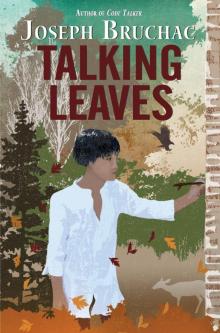 Talking Leaves
Talking Leaves Found
Found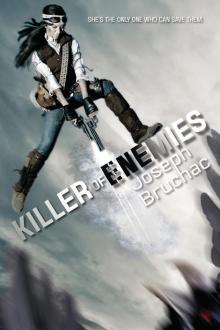 Killer of Enemies
Killer of Enemies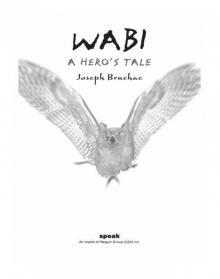 Wabi
Wabi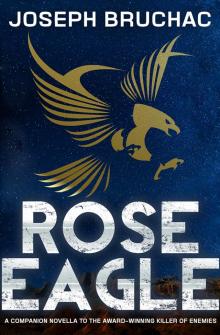 Rose Eagle
Rose Eagle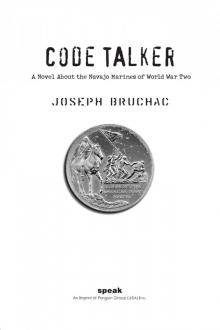 Code Talker
Code Talker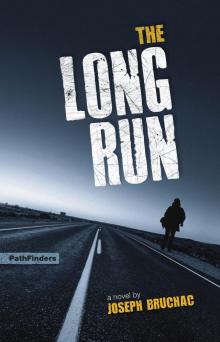 The Long Run
The Long Run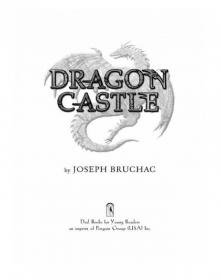 Dragon Castle
Dragon Castle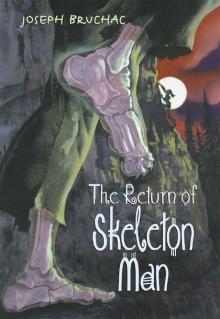 The Return of Skeleton Man
The Return of Skeleton Man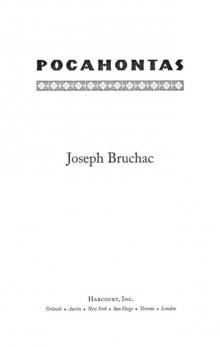 Pocahontas
Pocahontas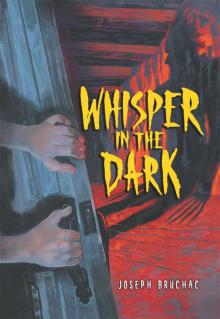 Whisper in the Dark
Whisper in the Dark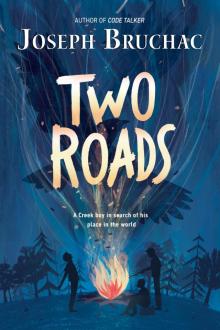 Two Roads
Two Roads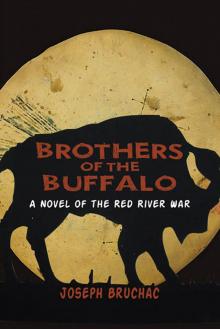 Brothers of the Buffalo
Brothers of the Buffalo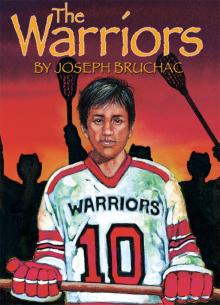 The Warriors
The Warriors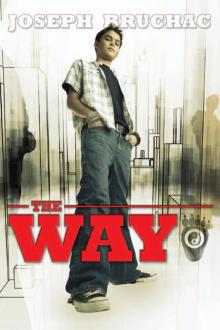 The Way
The Way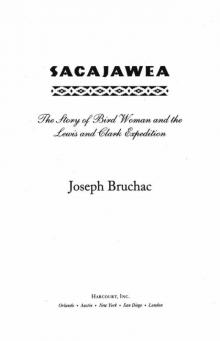 Sacajawea
Sacajawea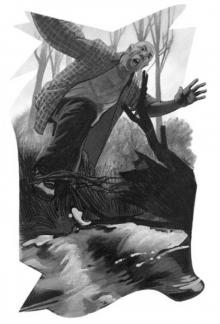 Night Wings
Night Wings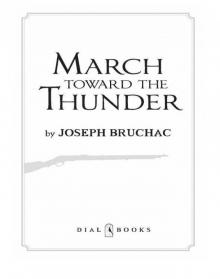 March Toward the Thunder
March Toward the Thunder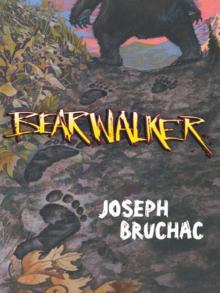 Bearwalker
Bearwalker Skeleton Man
Skeleton Man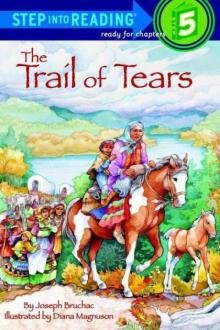 The Trail of Tears
The Trail of Tears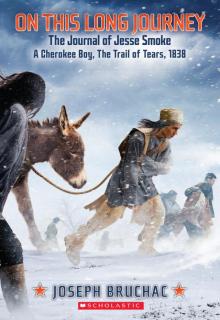 On This Long Journey
On This Long Journey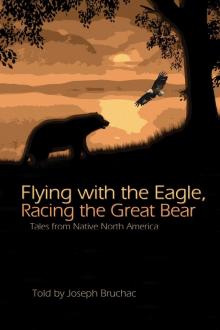 Flying with the Eagle, Racing the Great Bear
Flying with the Eagle, Racing the Great Bear